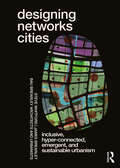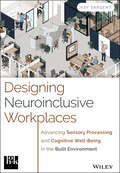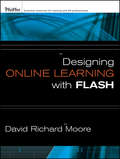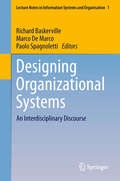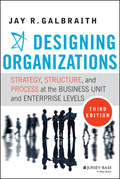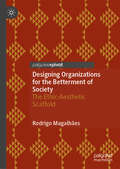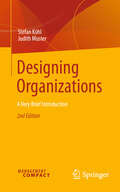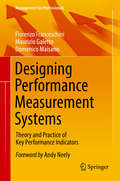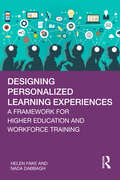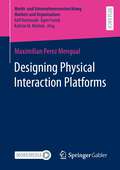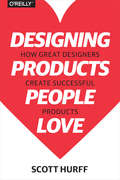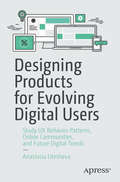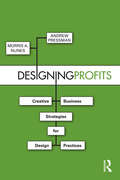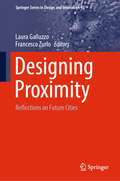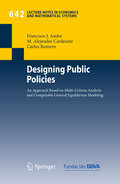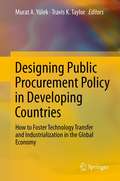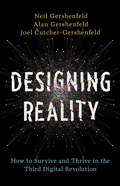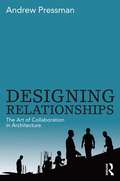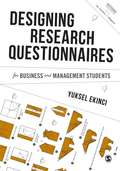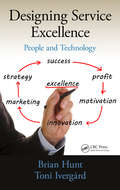- Table View
- List View
Designing Monetary and Fiscal Policy in Low-Income Countries
by Shamsuddin Tareq Jan Kees Martijn Gabriel Di BellaA report from the International Monetary Fund.
Designing Networks Cities: Inclusive, Hyper-Connected, Emergent, and Sustainable Urbanism
by Steve Whitford James Brearleydesigning networks cities presents a sophisticated, multi-disciplinary, and multi-dimensional approach to urban design. Emerging from years of practice, experimentation, and research by designers (landscape architects, urban planners, urban designers and architects), this approach engages with contemporary thought across a number of disciplines to re-invent the entrenched blunt instruments of the city making process. A cry for flexible, sharp-instruments in urban design, designing networks cities presents a multi-dimensional way of seeing the essential components of the city (form, space-time, order and aesthetics). It purposefully links traditional architectural design derivation mechanisms to urban design, in the hope that cities will not only be pragmatic, but also become sophisticated iconographically, poetically, and syntactically. It provides the tools to enable decision making within a multiplicity of constraints and opportunities: a philosophy of becoming, not being; a science of dynamic systems, not stasis; and an art of sensations, not subjectivity. And finally, and most importantly, it argues why it is important that cities embrace these multiple dimensions of society on a planet that is facing increasing environmental challenges: an economics focused on equity for all, not for some more than others; a politics supporting a genuine representational democracy, not one representing the overly influential; and a culture [including history] that embraces difference, not one that encourages division. designing networks cities not only provides the means to identify these issues and a methodology to deal with them within a complex emerging co-existence, but also demonstrates the development of cities that embrace and respond to the complexities of life in what some are calling the Anthropocene.
Designing Neuroinclusive Workplaces: Advancing Sensory Processing and Cognitive Well-Being in the Built Environment
by Kay SargentAssist the growing neurodivergent population with strategic adjustments to physical spaces Designing Neuroinclusive Workplaces: Advancing Sensory Processing and Cognitive Well-Being in the Built Environment explores how to employ strategic spatial zoning and sequencing, sensory zones, patterns, textures, colors, lighting, and soundscaping to create spaces that cater to the various sensory needs of neurodivergent individuals, who now make up 1/5 of the world's population. This group possesses unique strengths that can be harnessed if they are in environments designed to be welcoming and supportive of their needs. Written by Kay Sargent of HOK, a leader in the field of workplace design and architecture, this groundbreaking book argues that even minor adjustments to physical spaces can drive giant improvements in cognitive function, fulfillment, and belonging for both neurodivergent and neurotypical individuals. Some of the topics explored in this book include: Reimagining the design of offices and workplaces through a neuroinclusive lens Optimizing spaces to accommodate hypersensitivities across all six work modalities, ranging from focused tasks to collaborative endeavors Inclusion practices to boost productivity in the workplace and transform high-stress environments into more welcoming and functional spaces for everyone Filled with practical, actionable strategies for designing spaces that embrace and empower individuals across the neurodiversity spectrum, Designing Neuroinclusive Workplaces is a timely, essential read for all forward-thinking HR, DEI, and accessibility teams, as well as architects and interior designers.
Designing Online Learning with Flash
by David Richard MooreThere is a need for a book that provides a model of learning that is appropriate for online learning as well as teaches the user how to create potent Flash applications to deliver online learning content. This book is an Adobe Flash tutorial set in an instructional design context. It demonstrates how to develop Flash tutorials for teaching facts, concepts, principles, and procedures using Merrill s Component Display Theory. All the book s source files are provided as well as Adobe Captivate tutorials demonstrating the procedures.
Designing Organizational Systems
by Paolo Spagnoletti Marco De Marco Richard BaskervilleThis book is dedicated to the memory of Professor Alessandro (Sandro) D'Atri, who passed away in April 2011. Professor D'Atri started his career as a brilliant scholar interested in theoretical computer science, databases and, more generally information processing systems. He journeyed far in various applications, such as human-computer interaction, human factors, ultimately arriving at business information systems and business organisation after more than 20 years of researc hbased on "problem solving". Professor D'Atri pursued the development of an interdisciplinary culture in which social sciences, systems design and human sciences are mutually integrated. Rather than retrospection, this book is aimed to advance in these directions and to stimulate a debate about the potential of design research in the field of information systems and organisation studies with an interdisciplinary approach. Each chapter has been selected by the Editorial Board following a double blind peer review process. The general criteria of privileging the variety of topics and the design science orientation and/or empirical works in which a design research approach is adopted to solve various field problems in the management area. In addition several chapters contribute to the meta-discourse on design science research.
Designing Organizations
by Jay R. GalbraithThis Third Edition of the groundbreaking book Designing Organizations offers a guide to the process of creating and managing an organization (no matter how complex) that will be positioned to respond effectively and rapidly to customer demands and have the ability to achieve unique competitive advantage. This latest edition includes fresh illustrative examples and references, while the foundation of the book remains the author's popular and widely used Star Model.Includes a comprehensive explanation of the basics of organization designOutlines a strategic approach to design that is based on the Star Model, a holistic framework for combining strategy, structure, processes, rewards, and peopleDescribes the different types of single-business, functional organizations and focuses on the functional structure and the cross-functional lateral processes that characterize most single-business organizations.Features a special section on the effects of big data on organization design, and whether or not it will result in a new dimension of organizational structureHighlighting the social technologies used to coordinate work flows, products, and services across the company, this new edition of Designing Organizations brings theory to life with a wealth of examples from such well-known companies as Disney, Nike, IBM, and Rovio (Angry Birds) to show how various kinds of organization designs operate differently.
Designing Organizations for Performance: The Alignment of Design and Strategy
by Robert L. SimonsIn this chapter, the author brings the analysis down to the ground level--the level of individual people and business units--to test whether different designs are capable of implementing strategy successfully.
Designing Organizations for the Betterment of Society: The Ethic-Aesthetic Scaffold
by Rodrigo MagalhãesThere is an urgent need for the repositioning of organization design in today’s fast-moving technological, social and political environments. Building on the theory of human-centred design as a new foundation of the study of organization, this book offers a detailed model and approach that brings organization design to a new era of ethical and aesthetic concerns for the role of organizations in society. A new managerial role is put forward, the organization designer, as a unique set of responsibilities aimed at ensuring that the principles and values behind the organization’s purpose are not only upheld, but also permeate the entirety of the organization. The book contains a number of concepts that offer a unique contribution to the management literature and which can be applied in practice, perhaps as part of the organization’s regular staff development programs. It will be of great interest to academics and students of organization studies, business ethics, sustainability and strategic management.
Designing Organizations: A Very Brief Introduction
by Stefan Kühl Judith MusterWhen (re-)designing organizations, one must first be clear about what is meant by the structures of an organization and what can be done in order to change them. In this book, we present communication channels, programs and personnel as central structures. We also unfold the aspects that come to the forefront when one focuses on either the formal, the informal or the display side of an organization. At the core, we elaborate on how structures cause blind spots, and how these can be utilized for processes of change.
Designing Performance Measurement Systems: Theory and Practice of Key Performance Indicators (Management for Professionals)
by Domenico Maisano Fiorenzo Franceschini Maurizio GalettoGiven our rapidly changing world, companies are virtually forced to engage in continuous performance monitoring. Though Key Performance Indicators (KPIs) may at times seem to be the real driving force behind social systems, economies and organizations, they can also have far-reaching normative effects, which can modify organizational behavior and influence key decisions – even to the point that organizations themselves tend to become what they measure! Selecting the right performance indicators is hardly a simple undertaking. This book describes in detail the main characteristics of performance measurement systems and summarizes practical methods for defining KPIs, combining theoretical and practical aspects. These descriptions are supported by a wealth of practical examples. The book is intended for all academics, professionals and consultants involved in the analysis and management of KPIs.
Designing Performance Metrics at GoDaddy
by C. Fritz Foley Michael LemmScott Wagner has recently joined GoDaddy, a leading provider of cloud-based software and services that helped individuals and small businesses establish a web presence, in the dual role of chief operating officer and chief financial officer. One of his first tasks is to design a set of performance metrics that can be used to run the business. This case gives students the opportunity to develop a framework for thinking about GoDaddy's business and to design performance metrics that measure the health of the business and guide employee behavior.
Designing Personalized Learning Experiences: A Framework for Higher Education and Workforce Training
by Nada Dabbagh Helen FakeDesigning Personalized Learning Experiences offers theoretically grounded and pragmatic approaches to designing personalized learning initiatives for higher education and organizational contexts. With current research concluding that a multitude of variables can enable learners to direct their own experiences and achieve their goals, new guidance is needed to hone the range of instructional approaches, activities, and interactions available to support adult learners. This book offers practical strategies on how to design and implement effective personalized learning interventions, advance learning and engagement, encourage ownership over the learning process, and decrease attrition. Professionals in instructional design, learning and development, organizational development, consultancies, and beyond will be emboldened by the work to leverage a mix of technology-enabled social and content interactions.
Designing Physical Interaction Platforms (Markt- und Unternehmensentwicklung Markets and Organisations)
by Maximilian Perez MengualPhysical interaction platforms (PIPs) such as living labs, innovation labs or co-working spaces serve as environments for ideas, experiments, and collaborative innovation. They play a key role in value creation by orchestrating ecosystem actors and facilitating interaction, e.g. the exchange of goods, services, or social currency such as information. This book explores how PIPs can be systematically designed. It adopts a platform perspective, focusing on value creation for manifold actors as a fundamental element for the sustainable operation of a platform. Well-established insights from the design of digital platforms are taken as a foundation and adapted to the physical world. This analysis is compiled of 4 major studies, structured along the lifecycle of a PIP. The first study explores design dimensions of PIPs as a basis for a design process. The second study explores the design process of a PIP itself. The third study explores sustainable innovation of PIP during later stages of their lifecycle. The fourth study applies the findings and models from studies 1-3 in a PIP design process and evaluates them. This book addresses both scholars and practitioners alike. The models and the knowledge generated contribute to the scholarly understanding of spaces for innovation and value creation while enabling designers to create sustainably successful and engaging PIPs.
Designing Products People Love: How Great Designers Create Successful Products
by Scott HurffHow can you create products that successfully find customers? With this practical book, you’ll learn from some of the best product designers in the field, from companies like Facebook and LinkedIn to up-and-coming contenders. You’ll understand how to discover and interpret customer pain, and learn how to use this research to guide your team through each step of product creation.Written for designers, product managers, and others who want to communicate better with designers, this book is essential reading for anyone who contributes to the product creation process.Understand exactly who your customers are, what they want, and how to build products that make them happyLearn frameworks and principles that successful product designers useIncorporate five states into every screen of your interface to improve conversions and reduce perceived loading timesDiscover meeting techniques that Apple, Amazon, and LinkedIn use to help teams solve the right problems and make decisions fasterDesign effective interfaces across different form factors by understanding how people hold devices and complete tasksLearn how successful designers create working prototypes that capture essential customer feedbackCreate habit-forming and emotionally engaging experiences, using the latest psychological research
Designing Products for Evolving Digital Users: Study UX Behavior Patterns, Online Communities, and Future Digital Trends
by Anastasia UteshevaDigital user behavior is evolving at an ever-increasing pace, and predicting future trends is a booming business as a result. Users associate technology with their identities now more than ever, and it is up to you as a product designer to enhance their experience for the better. Designing Products for Evolving Digital Users is a 21st century handbook that helps you do just that. By providing insights that allow you to study UX (user experience) behavior patterns, online communities, and future digital trends, Designing Products for Evolving Digital Users instills confidence and fact-based foundations for your digital creations. Author Anastasia Utesheva expertly teaches you how to account for the way the technology impacts the identity of users and how that identity shifts through ongoing interaction with a product or service. She also brings in important case studies on social media, gaming, eRetail, and more to illustrate past examples of technology’s profound impact on communal and individual identity. Digital product design’s ultimate end goal is end user satisfaction. While a myriad of material is available out there consisting of simple tips and tricks for optimal digital design, Designing Products for Evolving Digital Users is a rare and remarkable title that cohesively accounts for all environmental factors involved. Comprehend how distributed technology impacts creation and negotiation of identity and explore communities that form around digital products. UX designers, futurists, students, and industry veterans alike have an abundance of invaluable learning ahead of them in Designing Products for Evolving Digital Users. What You Will LearnLearn how to design digital products/services that resonate with and transform identity of usersStudy how digital impacts formation of identityConsider how digital technology has impacted our world and implications for future digital trendsWho This Book Is For UX designers, digital product creators, entrepreneurs, educators, philosophy of technology enthusiasts, futurists
Designing Profits: Creative Business Strategies for Design Practices
by Andrew Pressman Morris A. NunesA successful design practice requires principals and staff who are creative, technically proficient, and financially savvy. Designing Profits focuses on the last component—the one that is so elusive for many architects, engineers, and construction professionals—the business aspects of practice. Not an ordinary book on practice issues or finance, Designing Profits explains the application of design thinking to guide wise business decisions. It is indeed possible to be as creative in establishing and operating a practice as in designing and constructing a building. The book offers comprehensive guidance and objective tools for design professionals to reap financial rewards from their practices, and to discover innovative strategies to become entrepreneurial and implement creative practice models. An extended case study is woven throughout the book. Witness the trials and tribulations of Michelangelo & Brunelleschi Architects as they engage problematic clients, tight project budgets and schedules, low fees and insufficient profits, marketing issues, quirky staff, technology upgrades, and growth, among other difficult challenges. This mythical firm, a composite of several real-life practices, navigates through these various dilemmas, providing readers with insights into superior financial management and a reimagined services portfolio.
Designing Proximity: Reflections on Future Cities (Springer Series in Design and Innovation #45)
by Francesco Zurlo Laura GalluzzoThis book showcases nine possible scenarios for future cities, based on different aspects and characteristics of the term "proximity". Different points of view have been investigated on many themes related to the city of proximities: from bottom-up design actions to the inclusive city, from neighborhood services to public space in transformation, to platforms and economies of proximity. When discussing the concept of proximity, it is imperative to several aspects of building and inhabiting the city of fifteen minutes. The city and its neighborhoods are complex structures, made up of stratified levels of evolving systems, that encompass administrative and political aspects, urban spatial considerations, the dynamics of human interaction, and more. The necessity to re-appropriate the urban space leads all inhabitants to contemplate different aspects of their lives concerning proximity space, reflecting on how behavior, actions, and relationships can be improved and transformed to make our future more sustainable. This book envisions future scenarios that will make public space an active and functional place for the city, more inclusive, responding to the needs and desires of the different populations that inhabit it.
Designing Public Policies: An Approach Based on Multi-Criteria Analysis and Computable General Equilibrium Modeling
by M. Alejandro Cardenete Carlos Romero Francisco J. AndréThis book presents a methodological approach for the joint design of economic and environmental policies. The starting point is the observation that, in practice, policy makers do not usually have a well-defined objective, but they are typically concerned about a number of economic and environmental indicators that conflict with each other. In view of this, policy making is addressed by combining two separate analytical approaches: multiple criteria decision making (MCDM) and computable general equilibrium (CGE) modeling. The aim is to come up with a methodological framework for policy design which is both operational and consistent with economic theory. In short, this book offers a unified view of this novel approach, paying special attention to the connections between economic and environmental objectives. The methodological foundations are presented as well as some real applications that illustrate the pragmatic value of the theoretical proposal.
Designing Public Procurement Policy in Developing Countries
by Travis K. Taylor Murat A. YülekThis book presents effective strategies for developing countries to leverage their public sector demand for manufactured imports to promote industrialization, trade, and technology transfer. Technology transfer and its absorption is considered one of the most crucial and complicated challenges for developing countries, which are characterized by insufficient infrastructure, low technological intensity of the domestic capital stock, and high levels of manufactured imports. Which strategies and policy tools can governments employ to link demand with technology transfer, thereby enhancing absorption capacity and development in emerging economies? This book is part of a broader project launched by PGlobal Global Advisory and Training Services Ltd., in cooperation with Istanbul Commerce University (İTUCU) and the Scientific and Technological Research Council of Turkey (TÜBİTAK). The contributors to this book are policymakers, academicians, and experts who are working together to identify problems and develop policy recommendations for public procurement with respect to economic development. The book includes theoretical, empirical, and case study analyses of technology transfer mechanisms, public procurement policies, and countertrade and offset strategies. The lessons learned from these chapters will be of interest to both academics and policymakers concerned with technology transfer, industrial policy, and economic development.
Designing Reality: How to Survive and Thrive in the Third Digital Revolution
by Neil Gershenfeld Alan Gershenfeld Joel Cutcher-GershenfeldThat's the promise, and peril, of the third digital revolution, where anyone will be able to make (almost) anythingTwo digital revolutions--computing and communication--have radically transformed our economy and lives. A third digital revolution is here: fabrication. Today's 3D printers are only the start of a trend, accelerating exponentially, to turn data into objects: Neil Gershenfeld and his collaborators ultimately aim to create a universal replicator straight out of Star Trek. While digital fabrication promises us self-sufficient cities and the ability to make (almost) anything, it could also lead to massive inequality. The first two digital revolutions caught most of the world flat-footed, thanks to Designing Reality that won't be true this time.
Designing Regulatory Policy with Limited Information (Harwood Fundamentals Of Pure And Applied Economics Ser.)
by D. Besanko D. SappingtonExamines policy design when the policy maker in imperfectly informed, focusing on cases where the regulated firm possesses better information about its technology than the regulator.
Designing Relationships: The Art Of Collaboration In Architecture
by Andrew PressmanIn today’s dynamic practice environment, collaboration and teamwork skills are increasingly critical to the successful completion of building projects. Indeed, it is the careful nurturing of comradeship among complementary but distinctive egos that drives creativity underlying the hi-tech algorithms that help shape complex projects. Designing Relationships: The Art of Collaboration in Architecture focuses on the skill set necessary to facilitate effective teamwork and collaboration among all stakeholders no matter what project delivery mode or technology is deployed. This book provides valuable guidance on how to design and construct buildings in a team context from inception to completion. It is the less tangible elements of collaboration and teamwork that provide the magic that transforms the most challenging projects into great works of architecture, and it is these more nuanced and subtle skills which the book brings to the fore. Showing examples of best and worst practice to illustrate the principles with real-life situations, this book presents the reader with an approach that is flexible and applicable to their everyday working life.
Designing Research Questionnaires for Business and Management Students (Mastering Business Research Methods)
by Yuksel EkinciIn Designing Research Questionnaires, Yuksel Ekinci guides you through origins, types of questionnaire, basic components, types of questions and properties of measurement scales, how to design a questionnaire, sequence of questions, layout decisions and pilot testing, examples and strengths and limitations. Ideal for Business and Management students reading for a Master’s degree, each book in the series may also serve as reference books for doctoral students and faculty members interested in the method. Part of SAGE’s Mastering Business Research Methods Series, conceived and edited by Bill Lee, Mark N. K. Saunders and Vadake K. Narayanan and designed to support researchers by providing in-depth and practical guidance on using a chosen method of data collection or analysis. Watch the editors introduce the Mastering Business Research Methods series.
Designing Research Questionnaires for Business and Management Students (Mastering Business Research Methods)
by Yuksel EkinciIn Designing Research Questionnaires, Yuksel Ekinci guides you through origins, types of questionnaire, basic components, types of questions and properties of measurement scales, how to design a questionnaire, sequence of questions, layout decisions and pilot testing, examples and strengths and limitations. Ideal for Business and Management students reading for a Master’s degree, each book in the series may also serve as reference books for doctoral students and faculty members interested in the method. Part of SAGE’s Mastering Business Research Methods Series, conceived and edited by Bill Lee, Mark N. K. Saunders and Vadake K. Narayanan and designed to support researchers by providing in-depth and practical guidance on using a chosen method of data collection or analysis.
Designing Service Excellence: People and Technology
by Brian Hunt Toni IvergardThe moment of truth-that instant when consumers experience and judge service quality-is often a deciding factor in business success. Designing Service Excellence: People and Technology provides practical information on the design, management, and organization of many different types of service industries, such as hotels, restaurants, banks and fina

